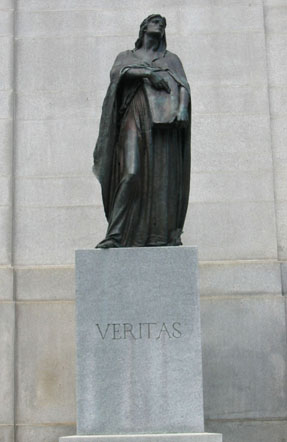The Supreme Court of Canada this morning upheld an anti-terrorism law enacted after the Sept. 11, 2001, attacks on the United States, ruling unanimously that those who choose to engage in terrorism must “pay a very heavy price.”

The law’s constitutionality was challenged by Mohammad Momin Khawaja, an Ottawa man convicted of terrorism for involvement with a British group that had plotted unsuccessfully to set off bombs in London. It was also challenged by two men accused of terrorism by the United States for trying to buy missiles or weapons technology for the Sri Lankan Tamil Tigers.
In
R. v. Khawaja, the court rejected arguments that the law’s definition of terrorism was overly broad. It also upheld Khawaja’s life sentence and in
Sriskandarajah v. United States of America confirmed the orders to extradite Suresh Sriskandarajah and Piratheepan Nadarajah to the United States.
Khawaja, the first to be convicted under the new anti-terrorism law, was sentenced in 2008 to 10-1/2 years in prison, and his sentence was then extended to life on appeal by the government.
The trial judge noted that Khawaja referred to Osama Bin Laden as “the most beloved person to me in the . . . whole world, after Allah,”, He was found to have participated in a terrorism training camp in Pakistan and to have designed a device dubbed the “hi fi digimonster” for detonating bombs.
“The appellant was a willing participant in a terrorist group,” Chief Justice Beverley McLachlin wrote in Friday’s 7-0 decision, adding he was “apparently remorseless.”
“He was committed to bringing death on all those opposed to his extremist ideology and took many steps to provide support to the group. The bomb detonators he attempted to build would have killed many civilians had his plans succeeded.”
In response to the ruling, Minister of Justice Rob Nicholson said: “I am pleased that, with today’s ruling, the Supreme Court of Canada has upheld the constitutionality of key anti-terrorism provisions in the Criminal Code and a life sentence for convicted terrorist Mohammad Momin Khawaja. By upholding this sentence, the court sent a strong message that terrorism will not be treated leniently in Canada."
The court also ruled that Canada can proceed to extradite the two men the U.S. has accused of involvement with the Tamil Tigers, which waged a bloody war for independence in Sri Lanka and is considered a terrorist organization by Washington and Ottawa.
Nadarajah is alleged to have tried to purchase surface-to-air missiles and AK-47 assault rifles for the Tamil Tigers from an undercover officer posing as a black-market arms dealer on Long Island, New York. Sriskandarajah, is alleged to have helped Tamil Tigers get electronic equipment, submarine and warship design software and communications equipment.
"I am also pleased that the court has recognized that the principles of procedural fairness were appropriately respected in the extradition cases of Mssrs. Sriskandarajah and Nadarajah and that their surrender for extradition was justified," said Nicholson.
The court disagreed that the federal law’s terrorism provisions had put a chilling effect on Canadians’ freedom of expression and was disproportionately broad.
McLachlin wrote that the law enacted 11 years ago next week, breached neither the Charter’s s. 2 guarantee of freedom of expression, nor its s. 7 guarantee of due process and fundamental justice.
“The purpose of the law does not infringe freedom of expression. While the activities targeted by the Terrorism section of the Criminal Code are in a sense expressive activities, most of the conduct caught by the provisions concerns acts or threats of violence,” says the ruling. “Threats of violence, like acts of violence, are excluded from the scope of the s. 2(b) guarantee. Moreover, the particular nature of the conduct enumerated in ss. 83.01(1)(b)(ii)(A), (B), (C) and (D) justifies treating counselling, conspiracy or being an accessory after the fact to that conduct as being intimately connected to violence — and to the danger to Canadian society that such violence represents. As such, the conduct falls outside the protection of s. 2(b) of the Charter.”
Update 12:15 p.m.: Comments from Justice Minister Rob Nicholson added.

 The law’s constitutionality was challenged by Mohammad Momin Khawaja, an Ottawa man convicted of terrorism for involvement with a British group that had plotted unsuccessfully to set off bombs in London. It was also challenged by two men accused of terrorism by the United States for trying to buy missiles or weapons technology for the Sri Lankan Tamil Tigers.
The law’s constitutionality was challenged by Mohammad Momin Khawaja, an Ottawa man convicted of terrorism for involvement with a British group that had plotted unsuccessfully to set off bombs in London. It was also challenged by two men accused of terrorism by the United States for trying to buy missiles or weapons technology for the Sri Lankan Tamil Tigers.